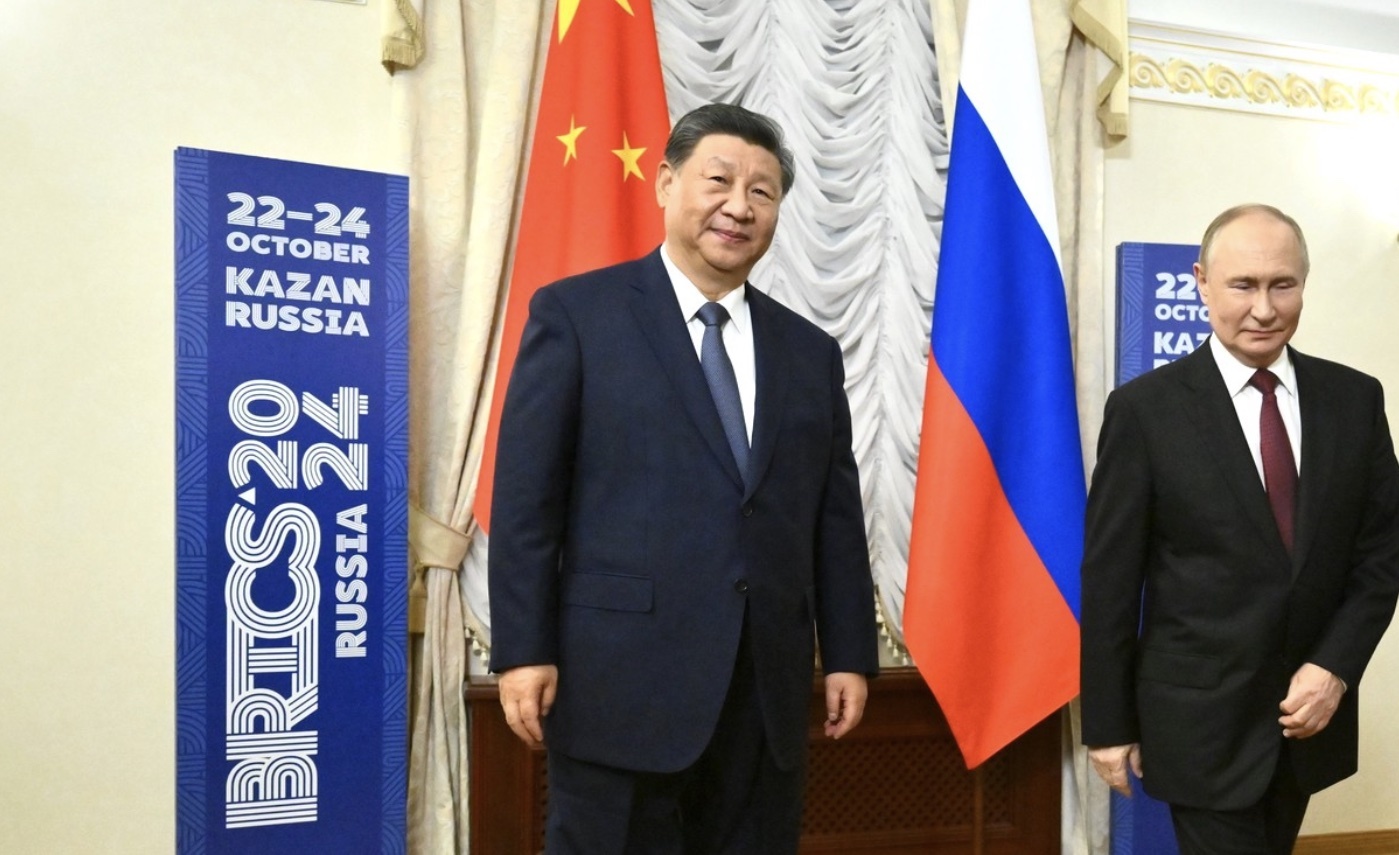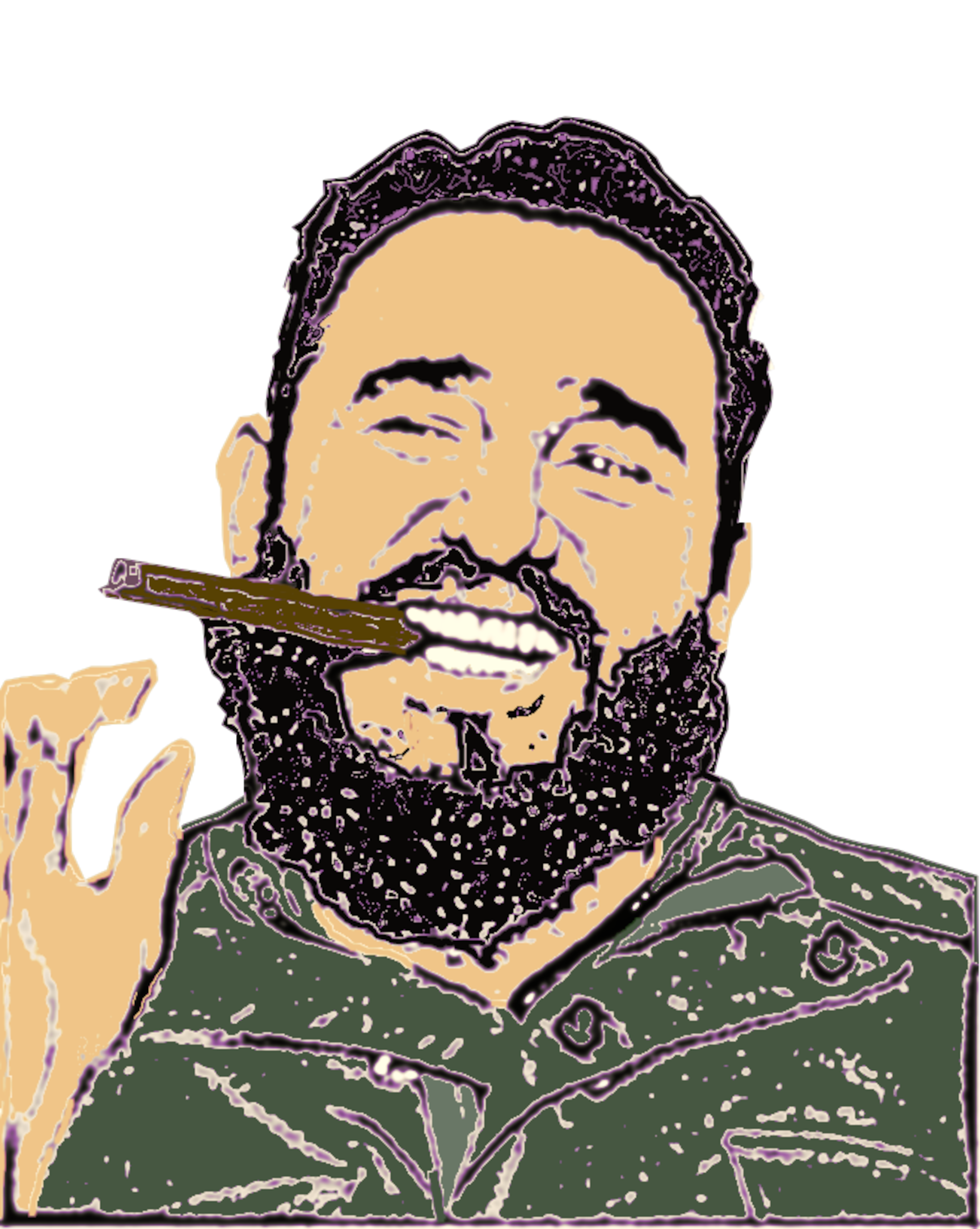Stuff like this gives me hope looking forward. Sure, USA is now mask-off facism, but the rest of the world is leaving it behind. Our job in the imperial core is to simply ensure that the decay takes down as few as possible with it.
That's what I'm most optimistic about as well. Things re gonna get shitty in the west, but it seems like the rest of the world will follow China towards socialism. I'd argue we're living through the reverse of the collapse of USSR. This time around it's the capitalist bloc that's in crisis, while the socialist countries are going from strength to strength.
I realize it's not as clearly cut this time around and there are plenty of capitalist nations in BRICS bloc. However, my hope is that as the liberal capitalist model becomes discredited, more countries will start to emulate what China is doing. And of course, things are finally looking up for DPRK, Cuba, and Vietnam.
I would feel so much better if Russia was still the USSR again and not a reactionary hell hole. Capitalists always fight for capitalism, and they will do that and try to become the new hegemony once they got the US out of the picture. It would benefit their oligarchs, just like it benefits the US's oligarchs right now, to keep their allies capitalist and not socialist.
Luckily at present, it benefits them to fight imperialism with the rest of the global south, and I know it's a bit far along to worry about, since we don't even know how BRICS will get through this period of the US and a lot can happen, I'm just worried about Russian (and Indian, if they keep electing similar people,) influence on the global south after the US has fallen. It sucks having all our chips on China, would be nice if there was an alternative.
I agree, it's a huge tragedy that USSR didn't last just a few more decades. If only the party did what was necessary and put Gorbachev against the wall.
They were so close to seeing the US decay lol. If only someone could've done what was necessary to Gorvachev and they pushed through.
The good news is that China paid attention, and they learned from the mistakes USSR made.
At least Russia and India have communist parties. There's plenty to be optimistic about
best case, and mostly sci-fi wishcasting, is after Putin United Russia fragments back into smaller parties and the communist grab a majority. then maybe get a kind of socdem/demsoc socially conservative state, starting to follow the China model. best case scenerio unfortunately i think
I still find myself surprised that Jeff Sachs, an architect of shock therapy, has come to some of these conclusions and writes op eds for common dreams lol
It seems like he has a genuine redemption arc where at some point he realized that the west are the baddies.
I think he claims to have been overruled on USSR restructuring and was radicalized by the process, but I’m a little fuzzy on that. He does have pretty good takes lately though.
IIRC he wanted to post soviet countries to go FURTHER in shock therapy. At least he seemed to think so a few years ago.
Yeah you’re probably right. The wiki makes it sound like the policies were intended to try and shortcut negative outcomes, but didn’t necessarily work out. I can’t find it but I remember a piece with him on DemocracyNow where he explained something to the effect that during this process post-USSR the whole thing was hijacked by western political goals and designed to enthrall Russia and his proposal was essentially torn apart/twisted.
In any case, I’ve found his commentary frequently interesting or useful. He tends to come down pretty hard on American hegemony/adventurism. Lots of similar positions to John Mearsheimer from what I‘ve watched.
That's who this is?!? I kept trying to remember why this name kept ringing a bell
Helped institute shock therapy, has become quite a critic of the west. He has level headed geopol takes now somehow
Critical support to Donald Trump and his destruction of the American empire.
I even remember a few political cartoons back in 2017 about The US deciding it doesn't want to be the new leader of the free world and
 or
or  should be the new one. It should have been the first sign to me that a lot of libs are comfortable civic fascists.
should be the new one. It should have been the first sign to me that a lot of libs are comfortable civic fascists.Good article, this is a tangential question that i thought while reading it - is there a fundamental difference even worth noting these days between neoliberal and neocon?
Neocon is a subcategory of neoliberal. Neoliberal is a big, overarching political ideology that encompasses Republicans, Democrats, and others. Neocon is a specific movement or trend within the "conservative" wing of neoliberalism.
Right I know that much but my point is whether there's actually a meaningful difference between any of them anymore.
Oh, I misunderstood your question, my bad. I read your wording as suggesting they were separate categories.
To answer your question, I think there's still a paleocon/neocon rift, so there's at least that much to distinguish elements of contemporary neoliberalism, but I think I agree with your implied thesis that the "left" wing of neoliberalism has withered to the point that it's at least quite difficult to distinguish it as having values distinct from one of the further right wing, it just talks about them differently.
I've heard self-described neo-liberals praise neocons by saying "neocons fight wars to make the world safe for neoliberalism". The difference between the 2 does not exist and even the neolibs/neocons don't think it meaningfully exists. As best, they could be said to have different immediate priorities.
Neolibs still want to preserve the "rules based order" in a more literal sense. Neocons want the American Empire and are not afraid to admit it. Neolibs also want it, but tend to believe this is achievable or even already achieved through the liberal world institutions and "globalization"(Marxist imperialism). Wars are not inherently good, despite being profitable, it must not be the first solution and/or it must be justified through these liberal institutions.
So in comparison, neolibs actualy believed in end of history, there are no more true enemies and everyone will eventualy accept the market or bend to economic interests e.g what they believed about China.
Neocons believe that is not enough or not yet and America must continue to fight their strategic enemies. They always saw China and Russia as key strategic enemies where the only solution is domination, they're very open about continuing with the Cold war mentality despite Russia's defeat.
When looking at a Trump government I think he wont be able to just impose his neocon idiot wishes without some pushback.
For example the current US military buildup against China is definitely a neocon initiative. Neolibs go along with it because they dare not confront the MIC but they also believe they can dominate China economicaly see CHIPS act, Yellen/Blinken going to China to threaten them with economic consequences and tell them they're wrong. They believe they can outcompete China but first China must play "fair" i.e become a western style economy based on consumption.
Neocons instead want war and real containment no matter the cost. So Trump will have to deal with a lot of western CEOs and investors that understand a significant part of their profits come from China. Neolibs want to contain China but don't necessarily agree with a full war, even more so US illegitimate aggression. Its why Taiwan is the "key", its the bait.
To give a better example, Musk loves Trump but he will also go to China and praise China. Why?
His second trip to the country in less than a year included a meeting Sunday with Chinese Premier Li Qiang, who praised Tesla as a “successful model” for US-China collaboration.
Because he understands China was one of his biggest market. Neolibs don't want to face the real consequences of a global war and global crisis. Money talks.
For neocons it doesn't matter as much as building the American Empire, an eye for an eye as long as the US wins in Asia it will be worth it, they fear to be missing the opportunity.
I really hope so but I’m a little pessimist. China keeps letting the US encircle them and screw them out of deals while doing nothing about it.
It seems like Russia and eventually India (with Brazil as a wild card) will be the faces of anti-imperialistic actions. But all these countries have a neoliberal problem, even China. I guess we can only wait and see if they actually make a turn left
China is doing plenty about it by building out a navy that can counter the US, and to which every war game US themselves played they lost. They're also building alliances all across the Global South, and moving away from using the western financial system.
China is playing it smart here because they realize that time is on their side. The US is already stuck in two wars, and their resources aren't infinite. Meanwhile, US economic power continues to wane globally and its relevance along with it.
Meanwhile, US economic power continues to wane globally
And US munitions with no quick way to ramp up production capacity.
Indeed, I don't think the US ever expected the war in Ukraine to go on this long and they weren't prepared for it industrially. Now Israel is piling problems on top of that, and it's not clear what the US can do here.
Brzezinski was decisively wrong, and his misjudgment helped to lead to the disaster of the war in Ukraine. Russia did not simply succumb to the U.S. plan to expand NATO to Ukraine, as Brzezinski assumed it would. Russia said a firm no, and was prepared to wage war to stop the U.S. plans. As a result of the neocon miscalculations vis-à-vis Ukraine, Russia is now prevailing on the battlefield, and hundreds of thousands of Ukrainians are dead
I agree with Sachs that Brzezinski was wrong. Sachs does not present the actual reasons why. Brzezinski claimed Russia was incapable of creating an anti-hegemonic collaboration in 1997. That was true, and it was true in much of the 2000's. At one point that obviously stops being true, Brzezinski's statement isn't evergreen that's simply now how history works.
However Brzezinski's statement could have been evergreen had the United States asked Russia to join NATO in 2000's. The NATO-Russia Council was the first step towards making Brzezinkski's statement evergreen. In 2000 there was a real potential for Russia to join NATO, Putin asked about an invite, NATO said a noncommittal "just apply" response. Had NATO rolled out the red carpet for Russia like they do for Ukraine now, Brzezinksi would have been right forever.
The United States would have extinguished Russia as a competitor had they allowed them a seat at the table comparable to other "Great Powers" of Europe. They did not. When the US picks partners like this, they want bootlickers and grovelers. They want the opposing party to know that they are subservient and to act accordingly, that the US is their savior. That's been the interaction between the US and most NATO expansion countries in the 2000's.
The US simply shot themselves in the foot with this one. The reality is that the US is incapable of running an amazing hegemony because of its obvious political neuroses. Those are problem #1, they can't even handle the #2 problem of the obvious contradictions in the world order and capitalism because they're stuck viewing it through a neurotic lens of their ideology. Those first order problems of neuroses have weakened the hegemony long before the second order contradictions start nipping at the seams. Those second order contradictions have been nipping, especially with Turkey.
The problem is that this was never possible because NATO is fundamentally subordinate to the US. All the other members are vassals as opposed to sovereign states that are equal partners. Russia was never going to subordinate itself to the US in that way.
I don't think that's true. Turkey has never been a subordinate to the US not to the same degree as any EU country. They've always been a wildcard in NATO. Likewise Russia especially Putin's Russia would be easy to subordinate. Putin needs flattery, he wants recognition that he's part of the club. Had America flattered Putin through official means 95-2010, Russia would be in the tank. There's very little actual ideological difference between the two countries ruling parties. If Putin was treated like a France level ally, where they're allowed their own sphere of influence and can influence/direct NATO operations, Putin would have fallen in line.
Just think about it, Russia-Chechnya is a copy-paste of a NATO counter terrorism operation. If Russia was in NATO and could say, hey lets do counterterrorism in Chechnya, whenever the US said "jump" they'd say "how high?"
The west was literally trying to get regime change in Turkey in the last election, and Turkey is now shifting towards BRICS as a direct result of that. Meanwhile, Russia is a far bigger and more powerful country than Turkey with a large military industry that rivals the US. That alone would simply not be acceptable to US because it would diminish its own power within NATO.
The goal of the west has always been to try t Balkanize Russia and then plunder the resources. This is what they tried to do during Yeltsin years and what Putin ultimately put a stop to. While Russia is capitalist, it does have its own interests and it does not see itself as an inferior to the west. That's the real point of contention.
The goal of the west has always been to try t Balkanize Russia and then plunder the resources. This is what they tried to do during Yeltsin years and what Putin ultimately put a stop to. While Russia is capitalist, it does have its own interests and it does not see itself as an inferior to the west. That’s the real point of contention.
I agree with this. My point is that I think this would also been possible through tiered neocolonialism by giving Russia a seat at the table.
The west was literally trying to get regime change in Turkey in the last election, and Turkey is now shifting towards BRICS as a direct result of that.
Turkey has always been playing both sides. It's bought Russian weapons throughout the 2000's to the detriment of NATO weapons dealers. Turkey has never been a rank and file loyal soldier. The US will always have to do this intranacine management within NATO, esp. with Turkey. In the case of France it has been resisting this kind of management and instead letting France manage it's own colonial legacy through NATO. France has resisted many hegemonic actions spearheaded by the US and the US has simply done internal propaganda against it and has left it mostly alone. My point is that this would have been a viable strategy for managing Russia within NATO and would have worked a lot better against it because unlike France who has a restive population, Russia has a captive population and is well-managed through its hypercapitalist oligarchy.
Not only that but tighter economic ties that would come through NATO would actually have allowed America to over time disassemble Putin's stranglehold within the country had they played the long game. Building up a cadre of oligarchs that overshadow Putin's power would have been a lot easier with NATO alliances, because everyone would get rich and many would not have wanted to rock the boat. The West's best tools of hegemony are economic and cultural. By attempting to isolate Russia they are fighting with one hand behind their back.
Putin's positioning in the 2000's was that he wanted a France-style relationship with NATO, not a Turkey one. He wanted NATO to roll out the red carpet as a show of that. That's ultimately why Russia and NATO fell out. Putin sought his own way.
The other benefit to this is that by giving Russia a France-style seat, it diminishes the power of France. France has special rules because in reality France is the leading military power of continental Europe. The UK is just a tag-a-long. By having 2 large military powers in continental Europe in NATO, the US can easily play one off of the other.
I agree with this. My point is that I think this would also been possible through tiered neocolonialism by giving Russia a seat at the table.
And I'm saying it wasn't possible because that would be directly at odds with the interests of the existing domestic oligarchs and the political class in Russia. They had no interest in handing the country over to the west.
Turkey has always been playing both sides.
Right, and that's why there are growing tensions with the west now. The only reason Turkey gets concessions is because NATO wants to have access to Black Sea, and that makes Turkey strategically important. However, the attempts at regime change clearly demonstrate that the west is not content with the status quo.
France may have resisted more than the rest of Europe, but it is politically captured by the US to a huge extent today. As we saw during recent elections, the Atlanticist centre was not displaced even despite being deeply unpopular with the public. France continues to pursue self destructive policy that benefits US in regards to Russia and China.
It's also worth noting that what you're describing is precisely the strategy that US took towards China. The US leadership thought that if they brought China into the fold, created economic ties, and so on, then eventually it would become a vassal. It didn't work in China and it wouldn't have worked in Russia.
All that said, it is true that Putin very much wanted to have friendly relations with the west at the start. I do think that if NATO was capable of treating Russia with respect then good relations would've been possible. However, my original point is precisely that equal relations were never on the table.
existing domestic oligarchs and the political class in Russia. They had no interest in handing the country over to the west.
I think this only holds true if you copy-paste Putin and the oligarchs from 2024 onto Putin and oligarchs in 2000. Putin is the reason oligarchs in Russia found ideological consistency and power ranking. During the years of Yeltsin and the early years of Putin, oligarchs were hypercapitalist outgrowths of organized crime, corrupt Soviet politican holdovers, and a new class of educated liberals leveraging knowledge and forging western ties. All of these people simply were stealing from the same pot, and trying to kneecap each other. They were all essentially vors, the oligarchs didn't care about "handing the country over to the West", they cared about personal enrichment. In fact the educated liberal oligarchs would have loved more Western ties.
In this critical period if the US blitzed strong economic ties and huge foreign direct investment, they would have easily bound Russia. If every oligarch regardless of position was offered significantly good deals from the US overnight, Putin would have either been forced into making a real mistake to capitulate to it or he would have had to fight it during a time where he was relatively weak.
The end of this period really started with the jailing of Mikhail Khodorkovsky in 2003, that's the point where Putin's direction and dominance finally crystalized. Compared to the jailing of Khodorkovsky the killing of Boris Nemtsov or any other actions against dissidents were swatting away flies. If in 2000 the red carpet was rolled out Russia would have been captured, and would only need the typical maintenance that the US offers to Gulf States.
Right, and that’s why there are growing tensions with the west now. The only reason Turkey gets concessions is because NATO wants to have access to Black Sea, and that makes Turkey strategically important. However, the attempts at regime change clearly demonstrate that the west is not content with the status quo.
Sure Turkey is embattled, but it's restrained. That's the point. By allowing Russia to slip out of NATO's grasp Russia doesn't have the same restraints.
France may have resisted more than the rest of Europe, but it is politically captured by the US to a huge extent today. As we saw during recent elections, the Atlanticist centre was not displaced even despite being deeply unpopular with the public. France continues to pursue self destructive policy that benefits US in regards to Russia and China.
Marcon's unpopular policy decisions such as raising the retirement rate, and neoliberal economic reforms wouldn't even raise an eyebrow in Russia with the public. Just look at how quickly Ukranians who are much more annoying as a population capitulated to IMF capture of their farmlands despite the existence of constitutional barriers. Conscription is deeply unpopular in Russia since WW2, and that barely creates resistance 3 years into a meat-grinder war.
It’s also worth noting that what you’re describing is precisely the strategy that US took towards China. The US leadership thought that if they brought China into the fold, created economic ties, and so on, then eventually it would become a vassal. It didn’t work in China and it wouldn’t have worked in Russia.
The problem with the US-China relation is the ultimate problem of the US as a Capitalist Empire. Capitalists and the runaway displacement of manufacturing were responsible for the US screwing up keeping the lid on China. In 1995-2003 Russia would not have represented a real shift away from US manufacturing given your previous observation and my agreement with that Russia is in fact a gigantic strip mine for natural resources.
However, my original point is precisely that equal relations were never on the table.
I agree, however I think that they weren't on the table more from the US side, than they were from the Russian side.
I think it's important not to fall for the whole great man theory here. Putin undoubtedly played a role in shaping Russia, but the reason somebody like Putin got in charge was rooted in the historical and material conditions after the collapse of USSR.
I do think you're right that if US treated Russia differently during the period after collapse, and actually helped Russia then the relationship could've been very different today. Sachs talks about this a lot incidentally.
There was a fundamental difference in perspective however. Russia didn't see itself as being defeated by the west. They initially saw dissolution of USSR as a peaceful gesture, and a step towards finding a common ground with the west. However, they quickly found out that the west wasn't interested in that and was looking to dominate. That's when the relationship started to turn sour.
Sure Turkey is embattled, but it’s restrained. That’s the point. By allowing Russia to slip out of NATO’s grasp Russia doesn’t have the same restraints.
It's true, but a big difference here is that Turkey was never in the same class as Russia which the biggest nuclear power with a huge military. The two can't be meaningfully compared.
Marcon’s unpopular policy decisions such as raising the retirement rate, and neoliberal economic reforms wouldn’t even raise an eyebrow in Russia with the public.
They very much would I assure you. Labor rights in Russia are still in a far better state than most western countries as a legacy of USSR, this is a great post on the subject https://archive.is/9tMtq
In 1995-2003 Russia would not have represented a real shift away from US manufacturing given your previous observation and my agreement with that Russia is in fact a gigantic strip mine for natural resources.
I agree with that, but I do think the real issue is that Russia sees itself as a sovereign power. That's where the similarity with China lies. The US can only deal with vassals, and they see sovereignty of other countries as being fundamentally unacceptable. So, I do think you are correct that the problem largely lies on the US side of the equation. Ultimately, the west would have benefited greatly from treating Russia as an equal and using it as a counterbalance to China.
It just kills me. The United States could have climbed down from the attempt at global hegemony, and been part of the multipolar world. All we had to do was give up just a little bit of control and we'd preserve the majority of our influence.
Instead, the stupid fucks are going to blow all of it and leave us as a pariah state










